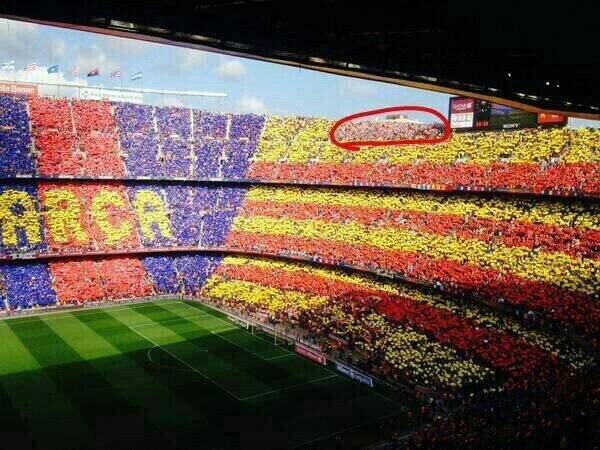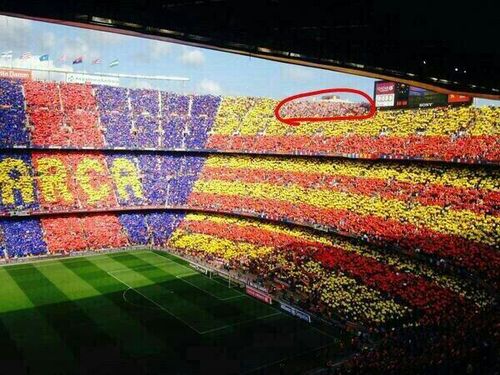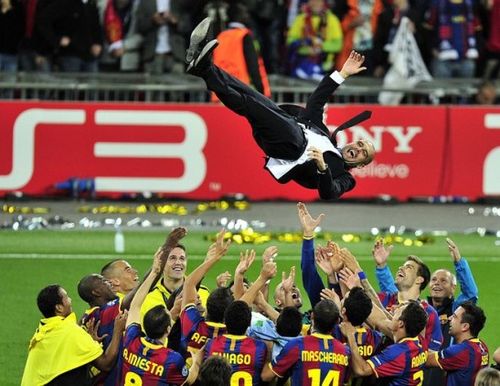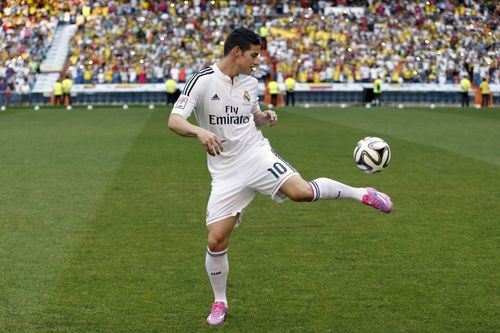
The Spanish Revolución – How La Liga is becoming the most exciting thing in world football today

Vamos Atléti!
March 17. 2014; that cathedral of Catalonian football, the Camp Nou, bounced as ninety six thousand five hundred and twenty six souls– most clad in the famously classic red and blue hues of their football club – cheered and celebrated on the famous terraces.
Their inside forward - Alexis Sanchez – had just smashed in a stunner to open the scoring in a title deciding match against their fellow challengers, a club from their hated rival city, Madrid.
With the Madrid club’s star striker and creative hub both having been subbed off due to injury, it appeared for the all the world that Futbol Club Barcelona were well on the way to do doing what they had done with such monotonous regularity over the past decade; win yet another La Liga crown.
Fuelled by the rise of the irrepressible Ronaldinho and later, the indomitable Josep Guardiola, the past ten odd years had seen a level of dominance that eclipsed even the tremendous domestic success enjoyed by Johan Cruyff’s magical dream team in the early ‘90s.
Barcelona had swept home six championships in nine years, five of them coming in the last six. The only other club to challenge and (occasionally) defeat them during that period (said period started from 2003-04 when Valencia won the title and then promptly went *kaput!*) was the arch enemy – a despised team from that hated rival city, and arguably the only team in the land bigger than Barca themselves - Real Madrid.

Pep Guardiola’s Barca side will go down in history as one of the greatest footballing sides of all time
Over the past nine years -more than any time in the long history of the beautiful game on the Iberian Peninsula - Real Madrid and Barcelona had taken their dominance of Spanish football to whole new levels.
These two had made a mockery of the league, playing at a plane so much higher than the other 18 teams in the division that those poor sods might as well have been in the second tier as far as realistic chances of winning La Liga were concerned.
Suffice to say, then, that it wasn’t altogether surprising when Barcelona walked out on to the pitch for the second half that day, with one hand on the trophy and a Madrid club desperate to stop them. Except the team from the capital was Real’s lesser known, less successful sibling Atlético.
For you see, football has a funny way of letting everyone know that this is after all the people’s game (even though this happens less and less frequently these days) and it’s the game on the pitch –not the name on the shirt –that matters at the end of the day.
Atlético Madrid never was a small club - being the third most successful country in a country with a long tradition of playing the game guarantees you that. But with 9 league titles against Barca’s 22 and Real’s monstrous 32, and with the last of those nine coming way back in 1995-96, they were not supposed to be too much trouble for either of the big two.
Yet, here they were, last game of the season, needing only a point to secure their first title in 19 years, and trailing to (an almost inevitable) Barca opening goal and suffering that (almost equally inevitable) double injury blow. If they had given up, no one would have raised a syllable in disappointment or anger.
No one but themselves.
Spurred on by the paltry four hundred and forty seven that had been allotted seats by the Catalans, El Chulo’s men did what came most naturally to them. Fight. And boy, did they fight!
When Diego Godin’s header smashed into the net behind Jose Manuel Pinto, the roar of that almost negligible contingent could be heard reverberating across the great stadium. (Stop here and picture this for a moment – 447 vs. 96,526 - *goosebumps*). Atléti, as was their wont, held on to clinch the draw and with it the title.
Finally, somebody else had won the bloody thing!
Summer reinforcements – not just for the big boys
Atléti had been playing well for a while under Diego Simeone’s tutelage but no one had seen this coming. Through an arduously killer season, they had sustained un-imaginable levels of intensity – playing each match as if it were their last – and walked away, heads held high, with that tenth league title tucked under their arms and a Champions League runner up medal (they had knocked out amongst others Mourinho’s mighty Chelsea and Barca on the way to the final – and had come to within a couple of minutes of actually winning the damn thing) around their necks.
Atléti had managed to rid themselves, and by extension, the rest of the league of the yolk of utter and almost dictatorial domination that the big two had subjected them to.
So, over the summer, Real and Barca did what they have always done whenever they have felt threatened (scratch that – threatened or not, they’ve always just done this) and bought newer, bigger, more expensive superstars.

Real’s latest Galactico – James Rodriguez – is introduced to the Bernabeu faithful
The Catalans revamped their forward line – ditching Sanchez in favour of the absolutely magical Uruguayan Luis Suarez, while also acceding to the need of the hour (replacing the ageing legs of Xavi) and brought in the classy Croatian playmaker Ivan Rakitic amongst a host others that included two young and upcoming shot-stoppers (Bravo and ter Stegen) and proper defenders (Vermaelen and Mathieu).
Real meanwhile were ‘content’ with World Cup winning genius and precision-passing-machine Toni Kroos and the extravagantly talented Colombian superstar James Rodriguez. The signings of the brilliant Keylor Navas and the (potentially) deadly Javier ‘Chicharito’ Hernandez were almost afterthoughts.
But for once, the ‘Others’ – the other top table finishers, the ones who had become accustomed to scrapping for the remaining European places - ended the transfer window better off, too.